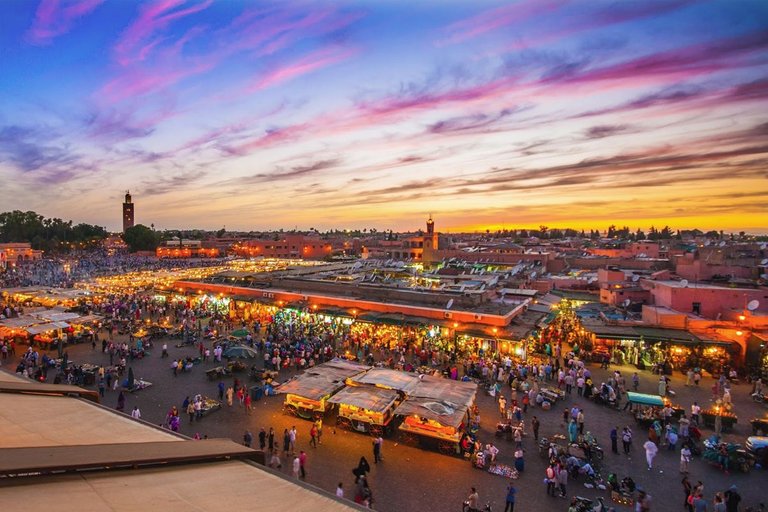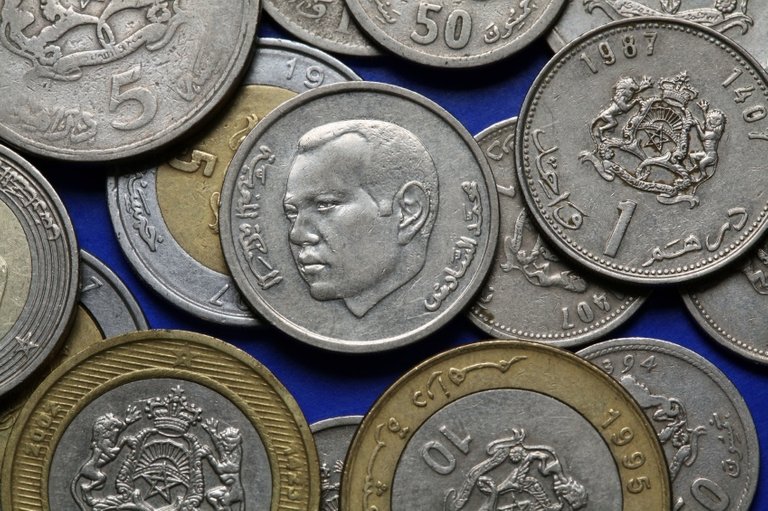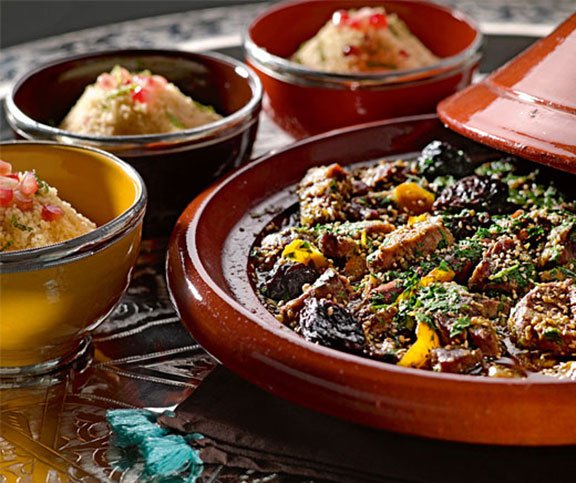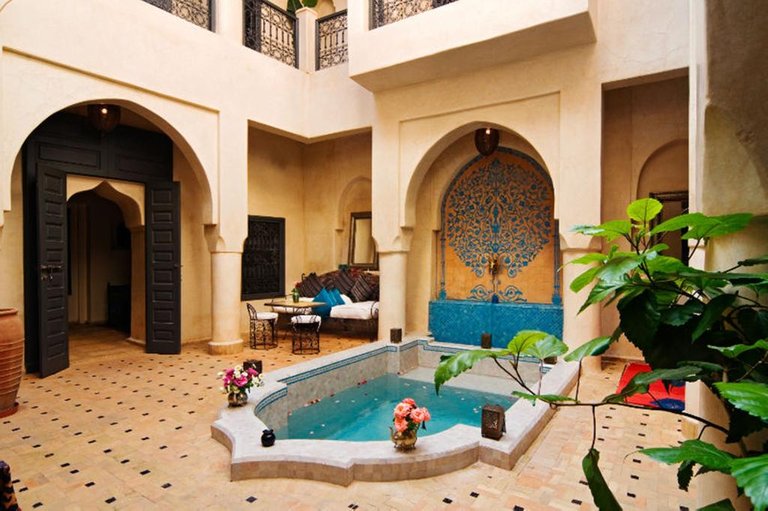
Presentation :
The name Marrakech originates from the Amazigh (Berber) words amur (n) kush, which means "Land of God." It is the third largest city in Morocco, after Casablanca and Fez, and lies near the foothills of the snow-capped Atlas Mountains. It is a few hours from the foot of the Sahara Desert. Its location and contrasting landscape has made it an enviable destination in Morocco.
Get in by :
By plane
.jpg)
Marrakech-Menara Airport (IATA: RAK), ☎+212 4444 7910, +212 4444 78 65, +212 4444 8506. Marrakech has an international airport with direct scheduled flights from London, Dublin, Oslo, Copenhagen, Stockholm, Paris and Madrid and many charter flights arriving from all over Europe. If you are flying from the US, Canada, Asia or elsewhere, you'll have to change planes in Casablanca.
Plenty of low cost companies fly to Marrakech. Some companies fly to Casablanca, where a plane change for the 45 min flight to Marrakech can be made.
Places that you can see :
1)- The Medina
The old, historic district of Marrakech.

The main square in the Medina is Djemaa El-Fna. It is surrounded by endless labyrinths of souks (bazaars) and alleyways covering all of the Medina. Djemma El-Fna is a must as there is always something to see there day and night whether it be snake charmers, acrobats, sooth-sayers, or the musicians and food stalls (some overcharging heavily). At night the square really comes to life as people navigate toward the exotic aromas and the entertaining sights. As the evening darkens, the hustle and bustle rages on. The exotic music appears louder and more hypnotic.
Directly south of the Djemaa El-Fna is Rue Bab Agnaou. A five-minute walk takes you straight to the famous Bab Agnaou entrance to the Kasbah district of the Medina. The Bab Agnaou entrance, through the ramparts, is by far the most impressive of all Medina rampart entrances. The Kasbah, in comparison to the Derbs (streets) surrounding the Djemaa El-Fna, portrays a calmer, less abrasive atmosphere. It is home to the Royal Palace, the former El-Badi Palace and the Saadian Tombs. This naturally creates better security, cleaner streets and a hint of being a special place in the Medina. The Kasbah has its own little bazaars (souikas), food stalls, restaurants, hotels and riads for travelers to enjoy.
2)- Visit the Palmeraie Palmeraie is the green lung of Marrakech. It is a real oasis on the outskirts of the city. La Palmeraie covers 13,000ha and has about 150,000 palm trees and some hotels. It is the perfect place to take a nomadic space of a few hours during a camel ride. During the course of your 20km journey you can admire the palm trees, beautiful villas and with a little luck a international star resort in Marrakech ! Lesamateurs for thrills, Quad prefer to camels.
3)- The Souks (suuqs), or markets of Marrakech, just adjacent to Place Djemaa El-Fna, are where you can buy almost anything. From spices to shoes, jellabas to kaftans, tea pots to tagines and much, much more. Undoubtedly, being a foreigner means you will end up paying higher prices than a native would, but bargain nonetheless. If you happen to run out of dirhams, you'll find plenty of people in the souks who will eagerly exchange your dollars or euros (though a fair rate here is less likely than at an official exchange). All that said, the sellers are much less aggressive than, say, Egypt or Turkey, so have fun!
4)- Koutoubia Mosque, right besides Djemaa El-Fna, is named after the booksellers market that used to be here. It is said that the minaret of the Koutoubia mosque is to Marrakech as the Eiffel Tower is to Paris. The minaret is visible from Gueliz which is connected to the Medina by Avenue Mohammed V. At night, the mosque is beautifully lit. As with most mosques in Morocco, non-Muslims are not allowed inside.
Money :

The Moroccan dirham (MAD) is officially designated a closed currency, meaning it can only be traded within Morocco. However, they are being sold and bought in travel agencies and at major airports in several countries (notably the UK). The import and export of the currency is tolerated up to a limit of MAD1000. Currency purchased during a visit to Morocco should be converted back before departing the country, with the exception of the MAD1000 level. You're advised to keep the receipts of currency exchange, as these will be required for the conversion back to foreign currency before departure, when you can change as many dirhams as you have left.
1$ ~ 10MAD
Cards:
Most credit cards are accepted (especially Visa, MasterCard), although surcharges will likely apply as the cost of credit card processing in Morocco is fairly expensive for businesses. Do be aware that only a relatively small amount of businesses in Morocco have the ability to accept credit cards, although the number is growing slowly.
Food :

Each night in the Djemaa El-Fna rows of street stalls are set up under giant white tents. These huts serve similar fare and have menus printed in French, Arabic and usually English. Everyone has tajine, couscous, brochette and soups. Some have specialties like offal, egg sandwiches or special tajines. Be aware that most restaurants employ rather insistent "greeters," who are very aggressive in getting customers for their stall. The line 'we already ate' seems to work well to get them to stop. Be aware that some of the tent restaurants overcharge heavily; you may easily end up with a bill five times higher than you should normally pay.
Sleep :

Marrakech has an amazing choice of places to stay ranging from tented camps outside Marrakech to cheap hostels and hotels that can be charming or seedy to luxurious kasbahs in luxurious gardens or the traditional riad (garden courtyard) hotels. Wherever you choose (or can afford) to stay it really is a must to visit one of the riad hotels to see this amazing style of architecture. Most riad managers will be happy to show you around provided that they are not too busy. In some riads you can book a lunch or dinner without being a resident provided that the riad is not privately rented. For example see Riad Cinnamon, Riad Laksiba and Riad Papillon.